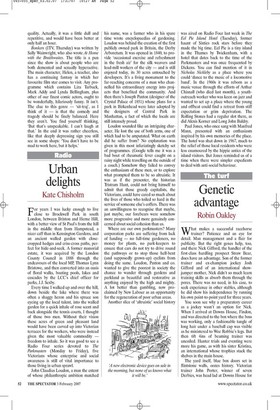Urban delights
Kate Chisholm El or years I was lucky enough to live close to Brockwell Park in south London, between Brixton and Herne Hill, with a better view of St Paul's from the hill in the middle than from Hampstead, a nicer caff than in Kensington Gardens, and an ancient walled garden with closecropped hedges and criss-cross paths, perfect for hide-and-seek. A former manorial estate, it was acquired by the London County Council in 1888 through the endeavours of the local MP, Thomas Lynn Bristowe, and then converted into an oasis of floral walks, boating pools, lakes and cascades by the LCC's chief officer for parks, J.J. Sexby.
Every time I walked up and over the hill, down beside the lake where there was often a shaggy heron and his spruce son eyeing up the local talent, into the walled garden for a quick inhale of rose scent and back alongside the tennis courts, I thought of those two men. Without their vision these acres of green and pleasant land would have been carved up into Victorian terraces for the workers, who were instead given the most valuable commodity — freedom to inhale. So it was good to see a Radio Four series devoted to The Parkmasters (Monday to Friday), five Victorians whose enterprise and social awareness is still of vital importance to those living in urban sprawl.
John Claudius Loudon, a man the extent of whose philanthropic ambition matched his name, was a farmer who in his spare time wrote encyclopaedias of gardening. Loudon was behind the creation of the first publicly owned park in Britain, the Derby Arboretum. It was opened in 1840, to provide 'occasional exercise and refreshment in the fresh air' for the silk weavers and lead-mill workers of the city — and is still enjoyed today, its 30 acres untouched by developers. It's a living monument to the far-reaching concerns of a man who channelled his extraordinary energy into projects that benefited the community. And then there's Joseph Paxton (designer of the Crystal Palace of 1851) whose plans for a park in Birkenhead were later adopted by the designers of Central Park in Manhattan, a fact of which the locals are still intensely proud.
Loudon sounded like an intriguing character. He lost the use of both arms, one of which had to be amputated. What on earth did he suffer from? No explanation was given in this most infuriatingly sketchy set of programmes. (Google tells me it was a bad bout of rheumatic fever caught on a rainy night while travelling on the outside of a coach.) Somehow they failed to convey the enthusiasm of these men, or to explore what prompted them to be so altruistic. It was as if the presenter, the historian Tristram Hunt, could not bring himself to admit that those greedy capitalists, the Victorians, could have cared so much about the lives of those who toiled so hard in the service of someone else's coffers. There was an unwillingness to recognise that maybe, just maybe, our forebears were somehow more progressive and more genuinely concerned about social cohesion than us.
Where are our own parkmasters? Many corporation parks are suffering from lack of funding — no full-time gardeners, no money for plants, no park-keepers to ensure that cars do not try to drive round the pathways or to stop those hell-bent (and supposedly grown-up) cyclists from doing the same. Loudon, Paxton and co. wanted to give the poorest in society the chance to wander through gardens and parkland as beautiful and restorative as anything enjoyed by the high and mighty. A lot better than gambling, now proclaimed by New Labour as an opportunity for the regeneration of poor urban areas.
Another slice of 'altruistic' social history was aired on Radio Four last week in The Eel Pie Island Hotel (Tuesday), former haunt of Sixties rock stars before they made the big time. Eel Pie is a tiny island in the Thames by Twickenham, with a hotel that dates back to the time of the Parkmasters and was once frequented by Dickens. You can find mention of it in Nicholas Nickleby as a place where you could 'dance to the music of a locomotive band'. In the 1960s it was reborn as a music venue through the efforts of Arthur Chisnall (who died last month), a youthoutreach worker who was keen on jazz and wanted to set up a place where the young and offbeat could find a retreat from stiff expectation or grim deprivation. The Rolling Stones had a regular slot there, as did Alexis Korner and Long John Baldry.
Paul Jones, who once sang with Manfred Mann, presented with an enthusiasm inspired by his own memories of the place. The hotel was shut down in 1967, much to the relief of those local residents who were less enamoured by the hippie antics of the island visitors. But Jones reminded us of a time when there were simpler expedients to deal with anti-social behaviour.




















































 Previous page
Previous page